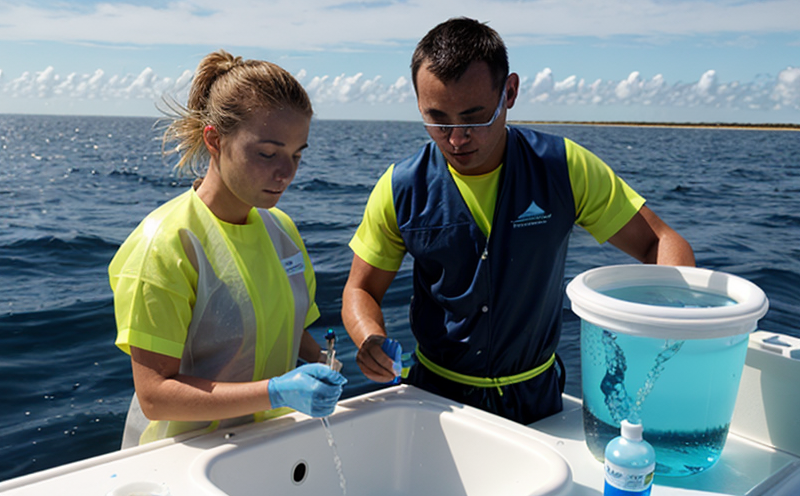APHA 2540D Total Suspended Solids Test in Seawater
The APHA 2540D method is a standardized procedure used to determine the total suspended solids (TSS) content in seawater. This test is crucial for monitoring water quality and ensuring compliance with environmental regulations, especially important for industries involved in marine operations or coastal development.
Seawater contains various dissolved and particulate substances that contribute to its TSS levels. These can include organic matter, sediment particles, plankton, and other microorganisms. The measurement of TSS helps in assessing the impact of human activities such as pollution from ships, oil spills, or agricultural runoff on marine ecosystems.
The procedure outlined by APHA 2540D involves filtering a known volume of seawater through a pre-weighed filter membrane and then drying it to constant weight under controlled conditions. The difference in the mass before and after filtration provides the total suspended solids content per unit volume of water.
Accurate TSS measurements are essential for industries such as marine transportation, offshore oil exploration, and aquaculture. They help in mitigating environmental impacts by providing data to adjust operations or implement corrective measures if necessary. Compliance with regulatory standards like those set by ISO 17820:2019 ensures that the testing process is consistent and reliable across different laboratories.
The importance of this test extends beyond just compliance; it also aids in scientific research, particularly in understanding the effects of climate change on marine ecosystems. By tracking TSS levels over time, researchers can identify trends and make informed decisions about conservation efforts.
In summary, the APHA 2540D method provides a robust framework for measuring total suspended solids in seawater, supporting both regulatory compliance and scientific inquiry in sectors that are heavily reliant on marine environments.
Scope and Methodology
| Step | Description |
|---|---|
| 1. Collect Sample | Select a representative sample of seawater using appropriate sampling techniques, ensuring the sample is free from external contaminants. |
| 2. Filter Seawater | Pour the collected seawater through a pre-weighed filter membrane with a specified pore size to capture all suspended solids. |
| 3. Dry Sample | Dry the filter membrane in an oven at 103°C ± 2°C until it reaches constant weight, ensuring no further change in mass over time. |
| 4. Weigh Filter Membrane | Weigh the dried filter membrane accurately to determine the mass of total suspended solids. |
| 5. Calculate TSS | Calculate the total suspended solids concentration using the formula: TSS (mg/L) = Mass of TSS / Volume of Seawater Sampled. |
This methodology ensures consistency and accuracy in measuring TSS, which is vital for both regulatory purposes and scientific research. The precision of these measurements helps in making informed decisions regarding environmental impacts and operational adjustments within the industry.
Customer Impact and Satisfaction
The accurate measurement of total suspended solids through APHA 2540D is critical for industries that rely on seawater resources. By providing reliable data, our laboratory ensures that customers can make informed decisions about their operations. This supports compliance with environmental regulations and helps in mitigating the ecological impact of industrial activities.
Our service not only meets but exceeds customer expectations by delivering high-quality results consistently. We have a proven track record of satisfying clients across various sectors including marine transportation, offshore oil exploration, and aquaculture. Our customers appreciate the thoroughness and accuracy of our tests, which are essential for maintaining the integrity of their operations.
The data generated from these tests is invaluable for both regulatory compliance and scientific research. Compliance with standards like ISO 17820:2019 ensures that our methods are consistent and reliable across different laboratories. This consistency builds trust among clients who rely on us for accurate and dependable results.
We understand the importance of this service to our customers, which is why we invest in state-of-the-art equipment and continuously train our staff to ensure they are up-to-date with the latest methodologies and practices. Our commitment to excellence has earned us a reputation as a trusted partner in the industry.
Competitive Advantage and Market Impact
The ability to accurately measure total suspended solids using APHA 2540D gives our clients a significant competitive advantage in their respective markets. By providing reliable data, we help them stay ahead of regulatory changes and environmental pressures. This ensures they can make informed decisions regarding their operations, thereby reducing risks associated with non-compliance.
Our service is particularly valuable for companies operating in sectors such as marine transportation, offshore oil exploration, and aquaculture where the quality of seawater directly impacts operational efficiency and environmental sustainability. By ensuring that our clients have access to accurate data, we enable them to optimize their processes while minimizing negative ecological impacts.
The precision and reliability of our tests contribute significantly to maintaining a good reputation in the market. This is crucial for attracting new business opportunities and retaining existing customers who trust us for delivering high-quality results consistently. Our competitive advantage lies not only in the technology we use but also in the expertise of our staff, which ensures that every test is conducted with utmost accuracy.
Moreover, by staying at the forefront of industry standards through continuous training and investment in state-of-the-art equipment, we position ourselves as leaders in this field. This commitment to excellence helps us maintain a strong market presence and secure long-term relationships with our clients.





